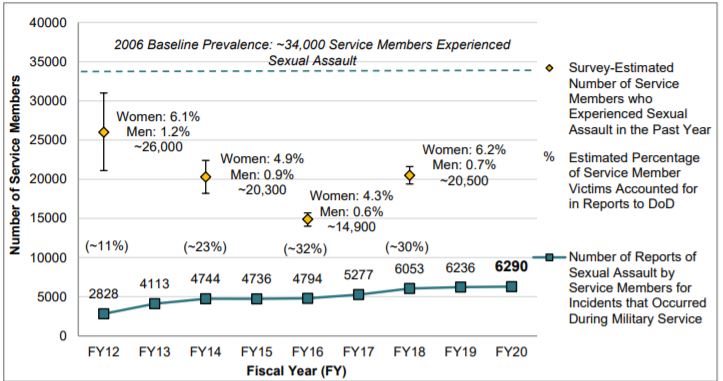Young, Middle-Age Veterans Affected
WEST HAVEN, CT — Young and middle-age veterans who experienced sexual harassment and assault during military service are at an increased risk for hypertension and, potentially, its cardiovascular complications, a new study suggested.
“Trauma can leave a lasting imprint, psychologically and biologically, and those two imprints are likely connected,” said the study’s lead author Allison E. Gaffey, PhD, a research psychologist in women’s health and cardiovascular medicine at the VA Connecticut Healthcare System in West Haven, CT.
“Historically, there is research showing combat exposure in veterans is a risk factor for hypertension,” says Gaffey, whose research is focused on the health risks of stress and trauma with a particular interest in the differing effects of exposures among men and women. “Other research in the general population has shown sexual assault may be associated with an increased risk of hypertension and cardiovascular disease.”
The research, funded by the VA, was presented during the virtual American Heart Association (AHA) Hypertension Scientific Sessions 2021.1
Considering that the rate of sexual assault and harassment in veterans—known as military sexual trauma (MST) —is about three times that of nonveterans and that MST reported by women is about 10 times that of men, Gaffey questioned whether MST is independently associated with risk of hypertension and whether the risk was different for men and women.
For answers, she and her colleagues turned to a national dataset of VHA electronic health records including 1.2 million veterans (mean age, 30.2 years; 12% female) who were discharged from the U.S. military since Oct. 1, 2001, and who received healthcare services at VAMCs from 2001 to 2017.
Post-9/11 Veterans

Click to Enlarge: Active Duty Estimated Biennial Prevalence Compared to Annual Reporting of Sexual
Assault
Gaffey said post- 9/11 vets were chosen in large part due to the growing proportion of women in the military as well as the availability of uniform MST information from veterans’ electronic medical records during that period. The health screening veterans complete during their first visit to VA asks whether they have experienced sexual assault or sexual harassment during their time in the military, she explained. If the answer to either question is yes, their electronic record is flagged for MST.
Through the 16 years of records reviewed, 33,881 veterans reported military sexual trauma, 65% of whom were women.
Other key findings:
- In total 307,332 veterans developed hypertension (15% women).
- MST was associated with a 30% increase in risk for incident hypertension in unadjusted models (hazard ratio [HR], 1.30; 95% CI, 1.28 – 1.33; P < 0.001).
- After adjustment for demographic characteristics, lifestyle behaviors such as smoking and BMI, psychiatric conditions including post-traumatic stress disorder (PTSD), anxiety and depression, MST remained significantly associated with hypertension (adjusted HR, 1.10; 95% CI, 1.08 – 1.12; P < 0.001).
- The link between MST and risk of hypertension remained for both men and women when the two groups were examined separately; however, the link was stronger among women (4% risk for men vs. 10% for women).
The most unexpected of those findings was that the link between MST and hypertension remained after adjusting for PTSD, “the signature condition that is associated with trauma,” Gaffey said.
“Previous work has shown that a diagnosis of PTSD is associated with cardiovascular risk,” she continued, “but it was surprising that, when we accounted for PTSD, there was still a strong relationship between MST and high blood pressure.”
One limitation of the study was that the medical record showed only whether patients reported MST. It did not specify whether a person experienced assault or harassment, or both, or how many times they experienced it—all of which could have an effect on a veteran’s psychological and physiological outcomes.
What the study does show is that a history of sexual abuse is an aspect of cardiovascular risk that doctors should be aware of, said Gaffey “Having an awareness that trauma is part of the picture of risk for hypertension and, potentially, later cardiovascular disease is important,” said Gaffey. “Many clinicians think about diet, exercise and smoking, but they may not always think about nontraditional factors, and trauma is one of those critical factors.”
Understanding the increased risk that MST may confer makes it more important to focus on modifiable risk factors in patients who have experienced such trauma. For those who have not already received counseling related to the trauma, it is important for providers to offer those services, Gaffey said. “That may help to buffer against the short and long-term health effects of trauma.”
- Gaffey, AE, Rosman, L., Haskell, SG, Brandt, CA, Military Sexual Trauma Is Associated With Incident Hypertension In A 16-year Cohort Study Of 1.2 Million Young And Middle-aged Men And Women. Hypertension. 2021; 78(suppl_1), A48-A48. DOI: https://doi.org/10.1161/hyp.78.suppl_1.48


